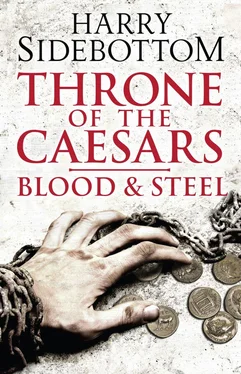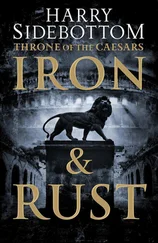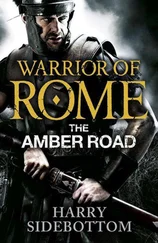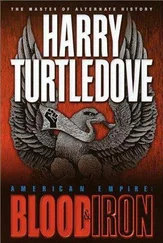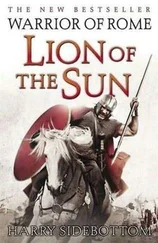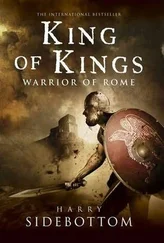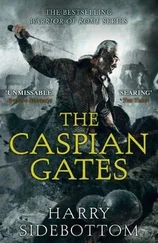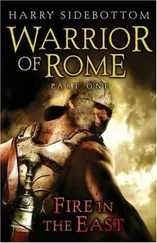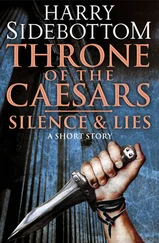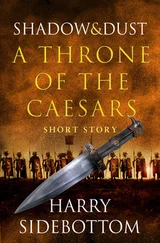Harry Sidebottom - Blood and Steel
Здесь есть возможность читать онлайн «Harry Sidebottom - Blood and Steel» — ознакомительный отрывок электронной книги совершенно бесплатно, а после прочтения отрывка купить полную версию. В некоторых случаях можно слушать аудио, скачать через торрент в формате fb2 и присутствует краткое содержание. Год выпуска: 2015, ISBN: 2015, Издательство: HarperCollins Publishers, Жанр: Исторические приключения, на английском языке. Описание произведения, (предисловие) а так же отзывы посетителей доступны на портале библиотеки ЛибКат.
- Название:Blood and Steel
- Автор:
- Издательство:HarperCollins Publishers
- Жанр:
- Год:2015
- ISBN:9780007499908
- Рейтинг книги:3 / 5. Голосов: 1
-
Избранное:Добавить в избранное
- Отзывы:
-
Ваша оценка:
- 60
- 1
- 2
- 3
- 4
- 5
Blood and Steel: краткое содержание, описание и аннотация
Предлагаем к чтению аннотацию, описание, краткое содержание или предисловие (зависит от того, что написал сам автор книги «Blood and Steel»). Если вы не нашли необходимую информацию о книге — напишите в комментариях, мы постараемся отыскать её.
Blood and Steel — читать онлайн ознакомительный отрывок
Ниже представлен текст книги, разбитый по страницам. Система сохранения места последней прочитанной страницы, позволяет с удобством читать онлайн бесплатно книгу «Blood and Steel», без необходимости каждый раз заново искать на чём Вы остановились. Поставьте закладку, и сможете в любой момент перейти на страницу, на которой закончили чтение.
Интервал:
Закладка:
Seven Hills : Metonym for Rome, from the seven hills on which the city was said to have been built; ancient lists, however, do not agree on their identity.
Shahba : Village on the border of Syria Phoenice and Arabia ; some miles north of the modern town of Bosra on the southern Syrian border.
Sicilia : Ancient name for the island of Sicily.
Sicoris : Ancient name for the Segre river, a tributary of the Ebro in northeastern Spain.
Simulacrum : Latin, ‘imitation’.
Sin : Ancient Assyrian moon god worshipped at Carrhae; husband of Nikal.
Singara : Highly fortified eastern outpost of the Roman empire in northern Iraq; modern Balad Sinjar.
Sirmium : Strategic border town in Pannonia Inferior ; modern Sremska Mitrovica in Serbia.
Sistan : Ancient region in eastern Iran and southern Afghanistan.
Sogdia : Ancient region to the north of Bactria, centred around Samarkand in modern Uzbekistan.
Sogdian Rock : A mountain fortress in Sogdia, captured by Alexander the Great in 328/7BC.
Sophist : A high-status teacher, usually of rhetoric; the sophists often travelled from city to city giving instruction and delivering speeches for entertainment.
Spatha : Long Roman sword, primarily designed for cutting; increasingly popular in the third century AD.
Speculatores : Roman army scouts and spies.
Stadium of Domitian : A running track originally intended for Greek-style athletic contests (never popular in Rome), constructed by the Emperor Domitian in the Campus Martius ; its outline is preserved in the modern Piazza Navona.
Statii : Members of the Statius family.
Stationarii : Soldiers serving on semi-permanent detachment from their units for local policing and other duties.
Statue of Victory : Statue of the goddess placed at the far end of the Curia; before each meeting of the Senate, rituals were performed at the accompanying altar.
Stoic : Ancient school of philosophy; followers were instructed to believe that everything that does not affect one’s moral purpose is an irrelevance; so poverty, illness, bereavement and death cease to be things to fear and are treated with indifference.
Street of the Sandal-makers : Street in ancient Rome running behind the Forum of Augustus and Temple of Peace.
Stylus : Pointed implement of metal or bone, used for writing in wax.
Styx : River marking the border of Hades in Greek mythology; impassable to the living, the dead were rowed across.
Subura : Poor quarter in the city of Rome.
Succurrite : Latin, ‘help me, save me’.
Suffect Consul : One of the additional Consuls appointed later in the year by the Emperors during the Principate; less prestigious than the pair of Consuls who held office at the start of the year.
Symposium : Greek drinking party, adopted as social gathering of choice by the Roman elite.
Synodiarchs : Greek term for a caravan protector, the unusual group of rich and powerful men historically known in Palmyra and in this novel in the city of Arete.
Syria Coele : Hollow Syria, Roman province.
Syria Palestina : Palestinian Syria, Roman province.
Syria Phoenice : Phoenician Syria, Roman province.
Syriac : Semitic language spoken in much of ancient Syria and Mesopotamia.
Syrtes : In antiquity, notoriously dangerous shoals off the coast of modern Libya.
Taenarus : The modern Cape Matapan on the southern shore of the Peloponnese; site of a cave believed to be an entrance to Hades.
Tantalus : In Greek mythology, punished eternally for stealing the food and drink of the gods by being forced to stand in a pool below a fruit tree, but unable to eat or drink.
Tarraco : Capital of the Roman province of Hispania Tarraconensis ; modern Tarragona in northeastern Spain.
Tarpeian Rock : Cliff overlooking the Forum Romanum in Rome, from which prisoners were thrown to their deaths.
Telamon : Modern Talamone on the northwestern shore of Italy.
Temple of Antoninus and Faustina : Temple dedicated to the deified Emperor Antoninus Pius and his wife Faustina, at the northeastern corner of the Forum Romanum ; much of the ancient building survives as the church of San Lorenzo in Miranda.
Temple of Peace : Monumental building with planted courtyard north- east of the Roman Forum.
Temple of Veiovis : The ancients were unsure whether this deity represented a youthful or ‘bad’ Jupiter; the temple, originally built by Romulus, overlooked the Forum Romanum from high ground to the west.
Temple of Venus and Rome : Temple designed by the Emperor Hadrian with back-to-back shrines for Venus, Roman goddess of love, and Rome, a deified personification of the city. In Latin, Roma (Rome) spelled backwards is amor , love. Situated east of the Roman Forum on the north side of the Sacred Way.
Tempus fugit : Latin, ‘time flies’.
Tervingi : Gothic tribe living between the Danube and Dnieper rivers.
Testudo : Latin, literally ‘tortoise’; by analogy, a Roman infantry formation with overlapping shields, giving overhead protection.
Thamugadi : Or Timgad, Roman city in northeastern Algeria; abandoned after antiquity.
Cyclades : Island group in the Aegean sea, named from the Greek for circle, because they form a group around the island of Delos, sacred in antiquity.
Thesprotis : Ancient region of northwestern Greece.
Thessalian persuasion : Ancient proverb of obscure origins.
Theveste : Town in northwestern Africa Proconsularis ; modern Tébessa in Tunisia.
Thrace : Roman province to the northeast of Greece.
Thracians : People from the ancient geographical region of Thrace, the southeastern corner of the Balkans.
Thugga : Or Dougga, major Roman city in Africa Proconsularis ; abandoned after antiquity.
Thysdrus : Town in central Africa Proconsularis ; modern El Djem in Tunisia.
Tibur : Ancient town northeast of Rome popular as a hill resort; modern Tivoli.
Toga Virilis : Garment given to mark a Roman’s coming of age; usually at about fourteen.
Toga : Voluminous garment, reserved for Roman citizens, worn on formal occasions.
Tresviri Monetales : Literally, ‘Three men of the mint’ board of junior magistrates responsible for the coinage.
Tribune : Title of a junior senatorial post at Rome and of various military officers; some commanded auxiliary units, while others were mid-ranking officers in the Legions.
Читать дальшеИнтервал:
Закладка:
Похожие книги на «Blood and Steel»
Представляем Вашему вниманию похожие книги на «Blood and Steel» списком для выбора. Мы отобрали схожую по названию и смыслу литературу в надежде предоставить читателям больше вариантов отыскать новые, интересные, ещё непрочитанные произведения.
Обсуждение, отзывы о книге «Blood and Steel» и просто собственные мнения читателей. Оставьте ваши комментарии, напишите, что Вы думаете о произведении, его смысле или главных героях. Укажите что конкретно понравилось, а что нет, и почему Вы так считаете.
